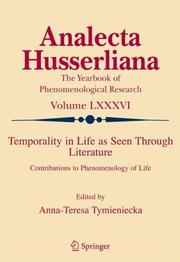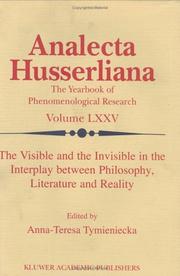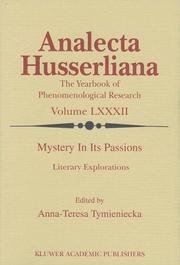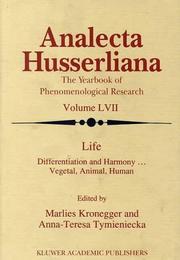| Listing 1 - 5 of 5 |
Sort by
|
Book
ISBN: 2841743373 9782841743377 Year: 2004 Volume: *3 Publisher: Paris 2e : Editions Kimé,
Abstract | Keywords | Export | Availability | Bookmark
 Loading...
Loading...Choose an application
- Reference Manager
- EndNote
- RefWorks (Direct export to RefWorks)

ISBN: 9781402053313 9781402053306 1402053304 Year: 2007 Volume: 86 Publisher: Dordrecht Springer
Abstract | Keywords | Export | Availability | Bookmark
 Loading...
Loading...Choose an application
- Reference Manager
- EndNote
- RefWorks (Direct export to RefWorks)
Temporality pervades the dynamic joint of existence, and the human being as such. As human beings unfold through ontopoiesis, each move of which punctuates the temporality of life, they, whose life experience, deliberation, planning, reflection and dreaming are permeated by temporal motivations and concerns, feel that they are engaged in the spinning of a common thread. Attributing to that involvement universal laws, constant existential validity and power, they absolutise/hypostasise its rule as a cosmic/human factor: time . Yet today technologies are transforming the temporality of our existence by accelerating, intensifying, expanding our partaking in the world of life. Human communal and social involvement is being challenged in its personal significance to the core of our being. What happens to time ? A basic reinvestigation of the nature of temporality is called for. Human creative endeavor - especially literature - may initiate it. Having the human subject - the creator - at its center, literature is essentially engaged in temporality whether that of the mind or of the world of life through the creative process of writing, stage directing, or the reader's and viewer's reception. Out of the cross-motivations that the creative mind filters in its temporal synthesis in touch with all the perspectives of existence, there surges the deepest significance of life in humanity and culture. But, first of all, life comes to light as timing itself in its logos. (Tymieniecka)
Philosophical anthropology --- filosofie --- wijsgerige antropologie --- persoonlijkheidsleer --- existentialisme --- Philosophy --- Time in literature --- Phenomenology and literature --- Life in literature --- Life --- Literature --- Time in literature - Congresses. --- Phenomenology and literature - Congresses. --- Life in literature - Congresses. --- Life - Congresses.

ISBN: 1402000707 9401038813 9401004854 9781402000706 Year: 2002 Volume: 75 Publisher: Dordrecht Boston Kluwer
Abstract | Keywords | Export | Availability | Bookmark
 Loading...
Loading...Choose an application
- Reference Manager
- EndNote
- RefWorks (Direct export to RefWorks)
Merleau-Ponty's categories of the visible and the invisible are investigated afresh and with originality in this penetrating collection of literary and philosophical inquiries. Going beyond the traditional and current references to the mental and the sensory, mind and body, perceptual content and the abstract ideas conveyed in language, etc., these studies range from the `hidden spheres of reality', to the play of the visible and the invisible left as traces in works of human genius, the origins of intellect and language, the real and the imaginary in literature, and the `hidden realities' in the philosophy of the everyday world. These literary and philosophical probings collectively reveal the role of this disjoined/conjoined pairing in the ontopoietic establishment of reality, that is, in the manifestation of the logos of life. In tandem they bring to light the hidden play of the visible and the invisible in the emergence of our vital, societal, intimate, intellectual, and creative involvements.
Phenomenology and literature --- Congresses --- Literature --- Philosophy --- Modern philosophy. --- Philosophy. --- Phenomenology . --- Aesthetics. --- Comparative literature. --- Metaphysics. --- Modern Philosophy. --- Philosophy, general. --- Phenomenology. --- Comparative Literature. --- God --- Ontology --- Philosophy of mind --- Comparative literature --- Literature, Comparative --- Philology --- Beautiful, The --- Beauty --- Esthetics --- Taste (Aesthetics) --- Art --- Criticism --- Proportion --- Symmetry --- Philosophy, Modern --- Mental philosophy --- Humanities --- Modern philosophy --- History and criticism --- Psychology --- Phenomenology and literature - Congresses.

ISSN: 01677276 ISBN: 1402017057 9401037698 9400710178 9781402017056 Year: 2004 Volume: 82 Publisher: Dordrecht Boston London Kluwer academic publishers
Abstract | Keywords | Export | Availability | Bookmark
 Loading...
Loading...Choose an application
- Reference Manager
- EndNote
- RefWorks (Direct export to RefWorks)
Religion and literature --- Phenomenology and literature --- Mystery in literature --- Literature --- Philosophy --- Comparative literature. --- Metaphysics. --- Phenomenology . --- Aesthetics. --- Philosophy. --- Comparative Literature. --- Phenomenology. --- Philosophy, general. --- Mental philosophy --- Humanities --- Beautiful, The --- Beauty --- Esthetics --- Taste (Aesthetics) --- Art --- Criticism --- Proportion --- Symmetry --- Philosophy, Modern --- God --- Ontology --- Philosophy of mind --- Comparative literature --- Literature, Comparative --- Philology --- Psychology --- History and criticism --- Religion and literature - Congresses --- Phenomenology and literature - Congresses --- Mystery in literature - Congresses

ISBN: 0792348877 9401062064 9401152403 9780792348870 Year: 1998 Volume: 57 Publisher: Dordrecht ; Boston ; London Kluwer academic publishers
Abstract | Keywords | Export | Availability | Bookmark
 Loading...
Loading...Choose an application
- Reference Manager
- EndNote
- RefWorks (Direct export to RefWorks)
In her Introduction, Tymieniecka states the core theme of the present book sharply: Is culture an excess of nature's prodigious expansiveness - an excess which might turn out to be dangerous for nature itself if it goes too far - or is culture a 'natural', congenial prolongation of nature-life? If the latter, then culture is assimilated into nature and thus would lose its claim to autonomy: its criteria would be superseded by those of nature alone. Of course, nature and culture may both still be seen as being absorbed by the inner powers of specifically human inwardness, on which view, human being, caught in its own transcendence, becomes separated radically in kind from the rest of existence and may not touch even the shadow of reality except through its own prism. Excess, therefore, or prolongation? And on what terms? The relationship between culture and nature in its technical phase demands a new elucidation. Here this is pursued by excavating the root significance of the 'multiple rationalities' of life. In contrast to Husserl, who differentiated living types according to their degree of participation in the world, the phenomenology of life disentangles living types from within the ontopoietic web of life itself. The human creative act reveals itself as the Great Divide of the Logos of Life - a divide that does not separate but harmonizes, thus dispelling both naturalistic and spiritualistic reductionism.
Life --- Phenomenology --- Phenomenology and literature --- Le Clézio, J.-M. G. --- Rio, Michel --- Criticism and interpretation --- Congresses. --- -Phenomenology --- -Phenomenology and literature --- -Literature --- Philosophy, Modern --- Congresses --- Philosophy --- Le Clezio, J.-M. G. --- -Rio, Michel --- -Criticism and interpretation --- -Congresses --- Literature --- Le Clézio, J.-M. G. --- Le Clézio, Jean Marie Gustave, --- Clézio, J.-M. G. Le --- Le Clézio, Jean-Marie Gustave --- Phenomenology . --- Philosophy and science. --- Philosophy of nature. --- Philosophy. --- Phenomenology. --- Philosophy of Science. --- Philosophy of Nature. --- Philosophy of Man. --- Mental philosophy --- Humanities --- Nature --- Nature, Philosophy of --- Natural theology --- Science and philosophy --- Science --- Life - Congresses. --- Phenomenology - Congresses. --- Phenomenology and literature - Congresses. --- Le Clézio, J.-M. G. - (Jean-Marie Gustave), - 1940- - Criticism and interpretation - Congresses. --- Rio, Michel - Criticism and interpretation - Congresses. --- Le Clézio, J.-M. G. - (Jean-Marie Gustave), - 1940
| Listing 1 - 5 of 5 |
Sort by
|

 Search
Search Feedback
Feedback About UniCat
About UniCat  Help
Help News
News